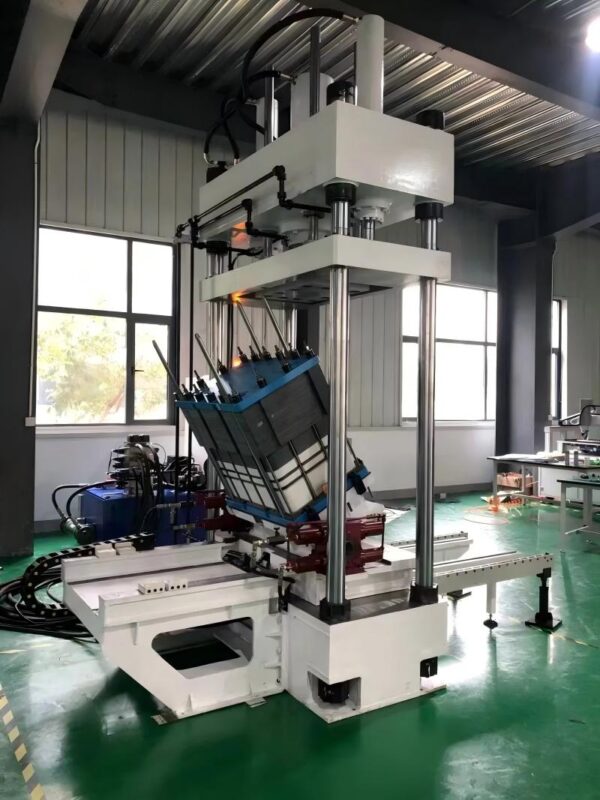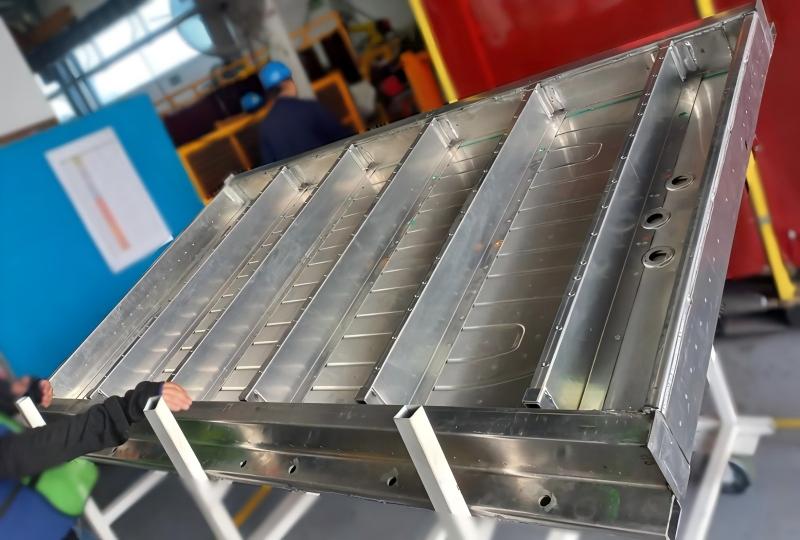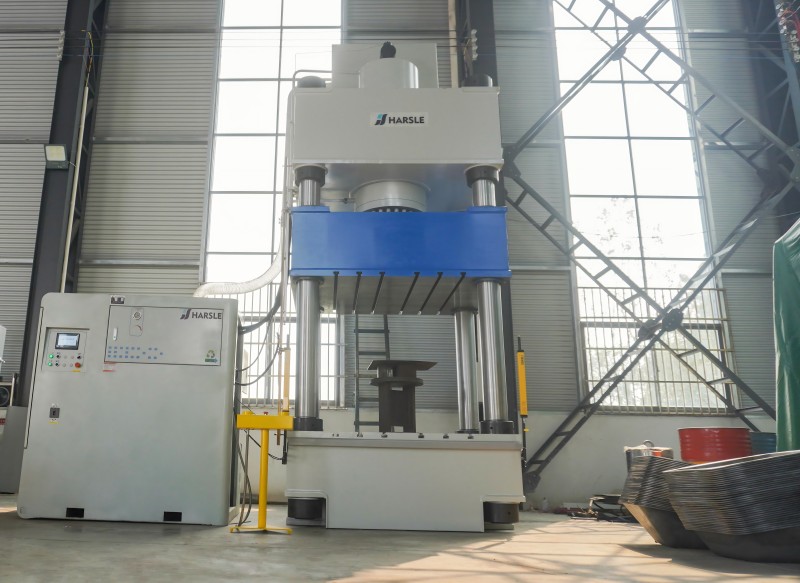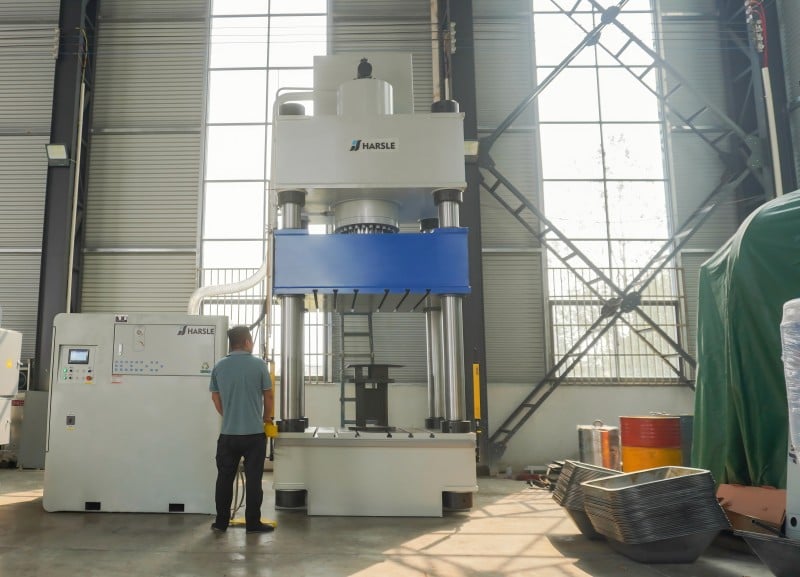مركز التوثيق
أدلة وإرشادات تقنية شاملة لمساعدتك على إتقان آلات HARSLE وتحسين كفاءة تشغيل المعادن لديك
لماذا نستخدم المكابس الهيدروليكية في إنتاج تخزين الطاقة؟
تُعدّ المكابس الهيدروليكية في إنتاج تخزين الطاقة ضروريةً للمصنعين الذين يسعون إلى تحقيق أعلى مستويات الدقة والسلامة والكفاءة من حيث التكلفة. تلعب هذه الآلات دورًا محوريًا في تشكيل وضغط وتجميع مكونات البطاريات بدقة فائقة. إذا كنت ترغب في فهم كيفية تحسينها لأداء التصنيع، فستُطلعك هذه المقالة على وظائفها الرئيسية وفوائدها وتطبيقاتها. في النهاية، ستدرك أهمية المكابس الهيدروليكية في صناعة تخزين الطاقة الحديثة، وكيف يُمكنها تعزيز الإنتاجية وجودة المنتج.
أهمية المكابس الهيدروليكية في إنتاج تخزين الطاقة
تُستخدم المكابس الهيدروليكية على نطاق واسع لضغط وتشكيل وتجميع مختلف مكونات البطاريات، بما في ذلك الأقطاب الكهربائية والأغلفة والهياكل الهيكلية. في إنتاج تخزين الطاقة، حيث يكون الاتساق والسلامة أمرًا بالغ الأهمية، توفر هذه الآلات القوة والتحكم اللازمين لضمان أداء موثوق. بخلاف المكابس الميكانيكية، يمكن للمكابس الهيدروليكية تطبيق ضغط موحد على مساحة سطح كبيرة، مما يضمن تشكيل المواد بدقة دون أي تلف أو تباين.
كيف تُحسّن المكابس الهيدروليكية تصنيع مكونات البطاريات

ضغط الأقطاب الكهربائية للحصول على كثافة طاقة عالية
من أهم خطوات إنتاج تخزين الطاقة ضغط مواد الأقطاب الكهربائية لتحقيق كثافة موحدة. تُعد المكابس الهيدروليكية مثالية لهذه العملية لأنها توفر ضغطًا ثابتًا، مما يُنتج سُمكًا ثابتًا للأقطاب الكهربائية. يؤثر هذا بشكل مباشر على كثافة طاقة البطارية وأدائها على المدى الطويل. باستخدام المكابس الهيدروليكية، يُمكن للمصنعين تقليل العيوب وتحسين كفاءة الأقطاب الكهربائية.
التشكيل الدقيق لأغلفة البطاريات

يجب أن تكون أغلفة البطاريات متينة ومحكمة الإغلاق ومتناسقة الحجم. توفر المكابس الهيدروليكية الدقة اللازمة لتشكيل أغلفة معدنية أو مركبة تلبي معايير السلامة والأداء الصارمة. بفضل أدوات التحكم القابلة للبرمجة، يمكن للمشغلين ضبط مستويات الضغط وفقًا لنوع المادة، مما يضمن أفضل النتائج سواءً عند العمل مع الألومنيوم أو الفولاذ أو السبائك المتقدمة.
تجميع وحدات تخزين الطاقة
تلعب المكابس الهيدروليكية أيضًا دورًا رئيسيًا في تجميع وحدات أنظمة تخزين الطاقة. خلال مرحلة التجميع، تساعد على تثبيت الخلايا والمكونات معًا بقوة مُتحكم بها، مما يمنع الأضرار الدقيقة ويضمن استقرارًا طويل الأمد. تُعد هذه القدرة بالغة الأهمية لوحدات تخزين الطاقة واسعة النطاق المستخدمة في شبكات الطاقة المتجددة والمركبات الكهربائية والتطبيقات الصناعية.
المزايا التشغيلية لـ مكابس هيدروليكية في إنتاج تخزين الطاقة

التنوع والتخصيص
تتميز المكابس الهيدروليكية بتعدد استخداماتها، ويمكن تخصيصها لمهام متنوعة، بدءًا من ضغط الأقطاب الكهربائية ووصولًا إلى تجميع الوحدات. وبفضل إعدادات الضغط المتغيرة وإمكانية برمجة المنطق، تتكيف بسهولة مع مختلف خطوط الإنتاج.
تحسين السلامة والموثوقية
تُعدّ السلامة من أهمّ الأمور في إنتاج تخزين الطاقة، خاصةً عند العمل بمواد حساسة للضغط والحرارة. تُوفّر المكابس الهيدروليكية آليات أمان مُدمجة، مثل الحماية من الحمل الزائد وأنظمة التوقف في حالات الطوارئ، مما يُقلّل من المخاطر على المُشغّلين ويضمن إنتاجًا موثوقًا.
الكفاءة وتوفير التكاليف
بفضل نتائجها المتسقة، تُقلل المكابس الهيدروليكية من هدر المواد وإعادة العمل. وهذا لا يُحسّن الكفاءة فحسب، بل يُخفّض أيضًا تكاليف الإنتاج الإجمالية، مما يجعلها خيارًا اقتصاديًا للمصنّعين الذين يتطلعون إلى توسيع نطاق عملياتهم.
التحديات والحلول الشائعة في الاستخدام مكابس هيدروليكية

الحفاظ على الدقة في ظل الإنتاج بكميات كبيرة
مع تزايد الإنتاج، قد يصبح الحفاظ على الدقة أمرًا صعبًا. تضمن المعايرة المنتظمة للمكابس الهيدروليكية نتائج ثابتة. كما يُساعد استخدام أدوات التحكم الرقمية المتقدمة على مراقبة الضغط وأوقات الدورة لتجنب التباين.
إدارة توازن الحرارة والضغط
قد تؤدي الحرارة الزائدة أثناء الضغط إلى إتلاف المواد الحساسة. لذا، ينبغي على المشغلين ضبط معايير الضغط ودرجة الحرارة بعناية للحفاظ على التوازن. وغالبًا ما تتميز المكابس الهيدروليكية الحديثة بأنظمة تبريد متكاملة لتلبية هذا المطلب.
التعليمات
لماذا تعتبر المكابس الهيدروليكية أفضل من المكابس الميكانيكية في إنتاج تخزين الطاقة؟
توفر المكابس الهيدروليكية تحكمًا متساويًا في الضغط، وهو أمر بالغ الأهمية لمكونات البطاريات التي تتطلب دقة وثباتًا. غالبًا ما تفتقر المكابس الميكانيكية إلى هذا التحكم الدقيق، مما يجعل الأنظمة الهيدروليكية أكثر موثوقية.
كيف تعمل المكابس الهيدروليكية على تحسين سلامة البطارية؟
من خلال ضمان تشكيل الأقطاب الكهربائية والأغطية بشكل متناسق، تساعد المكابس الهيدروليكية على منع المخالفات التي قد تؤدي إلى ارتفاع درجة الحرارة أو الفشل، وبالتالي تحسين السلامة العامة لمنتجات تخزين الطاقة.
ما هي الصيانة المطلوبة للمكابس الهيدروليكية في إنتاج تخزين الطاقة؟
تشمل الصيانة الدورية فحص مستويات السوائل الهيدروليكية، وفحص الأختام بحثًا عن أي تسريبات، ومعايرة المستشعرات. تساعد الصيانة الدورية كل 500-1000 ساعة تشغيل على الحفاظ على أعلى أداء.
هل يمكن أتمتة المكابس الهيدروليكية لإنتاج البطاريات على نطاق واسع؟
نعم، يمكن دمج مكابس الهيدروليكية الحديثة مع أنظمة الأتمتة والروبوتات، مما يتيح للمصنعين تحقيق أوقات دورة أسرع وحجم إنتاج أعلى دون المساس بالدقة.
خاتمة
تُعدّ المكابس الهيدروليكية في إنتاج تخزين الطاقة ضرورية لتحقيق الدقة والسلامة والكفاءة. فهي تُوفّر الاتساق الذي يتطلبه تخزين الطاقة الحديث، بدءًا من ضغط الأقطاب الكهربائية ووصولًا إلى تشكيل الأغلفة وتجميع الوحدات. بدمج المكابس الهيدروليكية في خط إنتاجك، يُمكنك تحسين جودة المنتج وخفض التكاليف وتحقيق ميزة تنافسية في قطاع سريع النمو. لمزيد من المعلومات حول تطبيقات الآلات أو لاستكشاف حلول مُخصصة لمصنعك، لا تتردد في التواصل مع فريقنا في HARSLE.













